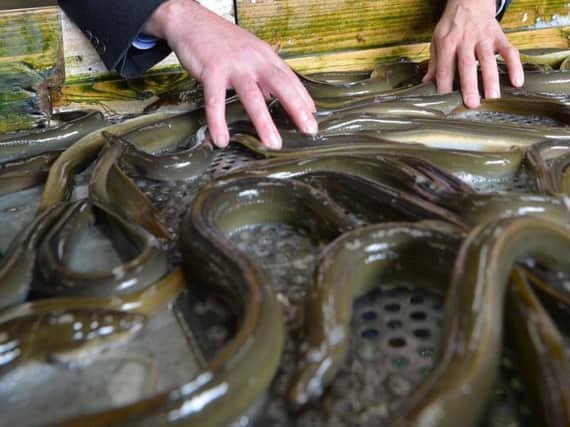Lough Neagh is a superb source of some marvellous wild, local fish


Now their main battle is to get people here to eat the fish that comes out of the lough – mainly eel, dolaghan and pollan. Dollaghan is a trout that tastes infinitely better than any farmed salmon you’ll buy.
Last week at Antrim Show, which took place at Shane’s Castle on the banks of Lough Neagh, I cooked eel, dolaghan and pollan. A wise woman, from Coalisland, gave me great advice on cooking eel: “Treat it like it has eight sides.”
Advertisement
Hide AdAdvertisement
Hide AdTraditionally eel would be cut through the bone, dusted with seasoned flour and then cooked gently in a pan, moving it frequently to ensure its cooked through. The oil from the eel has healing powers reported to be great for rubbing into painful joints. One woman in the audience took the excess oil away with her for that very purpose.
The eel was cooked for about 30 minutes then removed from the bone with a sharp knife. I glazed it with syrup made with Long Meadow dry cider and their vinegar along with local Antrim honey. It was accompanied by pickled celery, elderflower, smoked dulse crackers, apple and lovage dressing. I’ve included the recipe with the more user friendly smoked eel.
Not a morsel of the four eels I cooked was left. We’re scared of the thought of eating eel – it seems snakelike and slippy. The reality is that a chicken isn’t exactly going to win any beauty pageants but we eat it with gusto. Fish from Lough Neagh has 100% traceability, is natural and tastes delicious but we shun it in favour of farmed fish from goodness knows where.
Only a scattering of restaurants in Northern Ireland feature eel or pollan on their menu. Instead we are offered, and settle for, the ubiquitous farmed salmon or seabass. The salmon will invariably be Scottish and all the seabass we eat here come from Turkey. We live on an island surrounded by sea full of wild fish like mackerel, gurnard, hake, megrim sole, crab and lobster to name only a few.
Advertisement
Hide AdAdvertisement
Hide AdLough Neagh in the middle of Northern Ireland has fish that any other European country, and they do, would give a king’s ransom for. I point blank refuse to eat farmed fish and if we all did the same, and demanded wild local fish, the country would be better for it.
My other recipe is for pollan, a fresh water herring that was trapped in the lough during the last ice age. We export most of the pollan to Switzerland and forget about it here. It’s a beautifully flavoured fish that works well with crispy oats and bacon. I’ve added a recipe for lightly smoked pollan, fried in bacon fat with crispy oats and bacon and a roast onion dressing. The bacon needs to be dry cured. I used Kennedy bacon from Omagh – no white stuff will ever come out of it, only good natural fat.
You can buy Lough Neagh fish directly from the fishery at Toome or alternatively Easyjet do direct flights from Belfast to Zurich and Amsterdam where you can enjoy them where they’re celebrated properly.